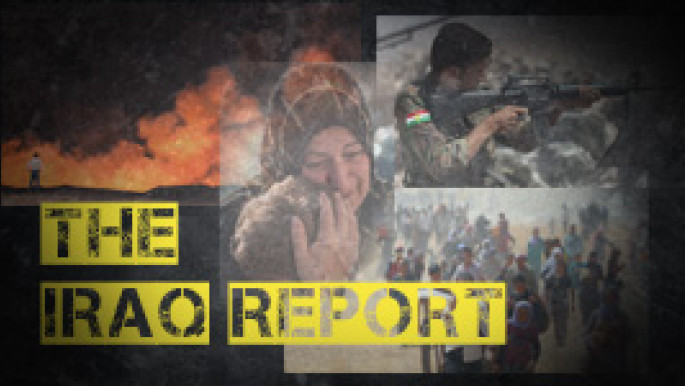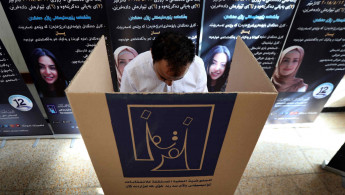Iraq: As parties fracture, signs of change emerge
The question is, once struck, will its flames spark a struggling democracy or carry Iraq into a continued political inferno?
General elections, planned for Saturday May 12, will mark only the third time Iraqi voters have cast a ballot for a prime minister since the 2003 US-led invasion. Incumbent PM Haider al-Abadi is up against shifting party affiliations, challenging historical sectarian divides.
When a budding Iraqi democracy was creating itself, the governing body built an election system where voters could cast ballots for party coalitions known as "lists", rather than voting for politicians directly. These lists have traditionally been unsurprising, but that's beginning to change.
This is not to say that long-standing divides are not the driving force sculpting the country's affairs - they surely are, but a pattern is surfacing.
The once sharp lines between Iraq's Sunni, Shia and Kurdish voting bases are beginning to blur, if even just slightly. In their place, inter-party disputes are taking the role of predictable ethno-religious frictions.
 |
It is very unlikely that any one list will have an overall majority. This will force political actors to compromise and construct cross-factional relationships to allow a functional government |  |
As attention shifts towards reconstruction, curbing corruption and gaining foreign investment, dissenting voices have grown distinct.
Rather than finding common ground within party lines, these differences are causing them to splinter. In a notable jump, this year's ballot will host nine parties as opposed to just four in 2014. As a result, it is very unlikely that any one list will have an overall majority. This will force political actors to compromise and construct cross-factional relationships to allow a functional government.
This is an indicator of two key developments in the country's statecraft; ethnicity alone is no longer sufficient to unite Iraq's political elite and the country's politics are moving past the years of conflict - in that for a least a decade having a unified ethnic voice was sine qua non.
Shia coalitions
Abadi, who remains the front-runner and Western favourite, has been forced to split from his own Shia-dominated Dawa party.
The Abadi camp has in turn formed the "Victory Alliance"; referring to his declared win over the Islamic State group. The split provides Abadi an opportunity to extend a hand across boundaries previously assumed by the Dawa party.
Nuri Kamal al-Maliki, the former prime minister and current vice-president, is running as the head of the Dawa party to reclaim the office now held by Abadi.
For years the two have been pointing the finger at each other in an effort to scapegoat Iraqi woes of poor governance and corruption. In Caesarean fashion, Maliki has made it impossible for Abadi to use party funds for his campaign.
 |
|
| Click here for our weekly round-up of events in Iraq |
Another dominant Shia voice emerging is that of Muqtada al-Sadr. During the Iraqi occupation, al-Sadr was the leader of the Mahdi Army, which strongly resisted Western authorities. Traditionally, Sadr and the Sadrist Movement has been one of Islamic nationalism, but in an unexpected move has joined forces with the stanchly secular communist party.
Together, the two have created the "Alliance of Revolutionaries for Reform" coalition. Al-Sadr was at first in league with Abadi - but withdrew his support to protest against government corruption. The move away from Abadi has given al-Sadr a following among Baghdad's youth, its poor, and even several smaller Sunni lists.
Kurdish coalitions
In the northern region of Kurdistan, the two major parties, the KDP (Kurdistan Democratic Party) and the PUK (Patriotic Union of Kurdistan), suffering from political follies are up against a new voice. Due to their perceived failures during the independence referendum and the consequential withdrawal from Kirkuk; where Kurdish leadership relinquished control of airports, oil reserves and borders, a tired band of Kurdish voters are demanding more of their leaders.
A new alliance brings three of the region's opposition parties under the unified banner of the "Homeland" coalition ["Nishtiman"]. A familiar face, Barham Salih, the former KRG prime minister and long time opponent of the current leadership, heads the new list.
In an enterprising move to consolidate votes, the Homeland coalition embraces the voices of the "Change Movement" ["Gorran"], the "Kurdish Islamic Group" ["Komal"] and the "Coalition for Democracy and Justice".
Read more: More divided than ever, Iraq's Kurds risk shooting themselves in the foot
During a PUK campaign rally in Erbil last Tuesday, this resistance was embodied by a resident of the disputed city of Kirkuk.
Mr Saman, who refused to give his last name due to fear of reprisal, showed his support for the new Homeland coalition as he stood on the sidelines, waving the three flags of the new political alliance.
"Leaders of PUK, leaders of KDP, are old in thought. We need new [leaders] in Kurdistan if we are to survive," he declared as onlookers shouted back in protest.
"Look around," he said, pointing to the scores of plastic bottles and trash amassing in the street. "This is how the PUK left Kirkuk, this is how they will leave us."
 |
| The aftermath of a PUK rally in Erbil. Some here are worried the party will leave Kurdistan in a mess [Yomi Kleinmann] |
PMF leaders and Iranian influence
This year's elections also bring an appearance of iron fist militant candidates.
During the fight to take back Iraqi territory from the proclaimed IS "caliphate", the country deployed a slew of militias under an umbrella coalition known in English as the Popular Mobilisation Forces. These predominantly Shia paramilitary units, which draw significant backing from Iran, were pivotal in the recapture of territory.
 |
As military action has slowed in the fight against the Islamic State group, several PMF leaders have refashioned themselves in a move towards politics. |  |
In November of last year, Prime Minister Abadi banned militia leaders from running in elections, saying he wanted to create "a clear separation between [Iraq's] political and armed groups". The policy came in response to the growing influence and popularity of ranking PMF officers in liberated regions. Several of these units, including the Asa'ib Ahl al-Haq, are at the behest of non-state actors and are frequently accused of being Iranian proxies.
As military action has slowed in the fight against the Islamic State group, several PMF leaders have refashioned themselves in a move towards politics. In an attempt to circumvent the Abadi law, some paramilitary figures have "renounced" their titles, claiming to be unaffiliated with armed groups.
"Retired" PMF general Hadi Al-Amiri now heads the "Fatah Alliance". The name is an unmistakable gesture towards top Shia cleric Grand Ayatollah Ali al-Sistani. In 2014, Sistani called upon the Shia community to take up arms to conquer or, "Fatah", the threat of the Islamic State group.
Comment: What's dividing the PMF in Iraq's election?
In spite of popular fears over Iranian influence in Baghdad, and the new Abadi law preventing militia leaders sitting as heads of state, the Fatah Alliance is expected to do well in Saturday's election.
Iranian influence has in itself grown into a point of contention. Iraq naturally wants to remain unmoved by foreign actors - but will surely depend on investment from Tehran in the coming years.
The Iran issue has shifted alliances, making for some odd bedfellows. The Abadi-led Victory Coalition tried to make nice with the Fatah Alliance. The union was short-lived, only lasting a day after Abadi's base and other anti-Iranian groups took issue with the partnership.
The move left Victory with a net negative result.
Supporters split with the Abadi coalition on both sides of the issue, questioning either the initial intention to unify with or the quick reversal of the alliance. This left the spotlight on Abadi's inability to manage internal political interests and appease coalition members. Such a lack of confidence suggests future difficulties in maintaining a post-election majority if Victory wins. It also leaves Abadi vulnerable to making political concessions to minority groups in order to gain a majority.
Sunni populations
Iraq's Sunni population has taken the brunt both of the effects of IS' rise to power, and its downfall.
The civilian populations in and around Mosul and throughout the Anbar province are still recovering from the almost four-year war. Sunni leaders are contesting that the election should be put off until a majority of the country's 2.6 million internally displaced people have been relocated and brought back to their homes.
The Iraq Report: Elections without participation is no democracy
They argue that because the IDPs, the majority of whom are Sunni, remain displaced, elections cannot be fair - furthering Sunni disenfranchisement that caused many to join IS in the first place. The Iraqi Supreme Court, however, ruled the election was to be held as planned.
From discord, an opportunity
Beyond the heavy-handed business of tackling corruption, job creation and bolstering foreign investments, whomever is prime minister after this election will undoubtedly have the tough task of navigating a reinvigorated political machine to form a workable government.
Within these constructs of struggle and mounting disparities among Iraq's ruling elite, Iraq is being handed an opportunity to re-establish its vehicles of change, albeit under a forced hand.
The root of democracy is its ability to debate issues - for dissenting voices to be given a platform and the freedom to express views without fear of retaliation or exclusion.
It's a matter that many "established democracies" are dealing with these days, the West included. Though Iraq may not yet be the poster child for an up-and-coming model democracy, this phenomenon of major parties crossing historical and divisive boundaries may yet be a glimpse into a pluralistic future for Iraq.
Joachim "Yomi" Kleinmann is a freelance journalist currently based in northern Iraq. He previously reported from the frontlines of the fight against the Islamic State group and amid the chaos of the aftermath of the Kurdish election. Read his previous work for The New Arab here.



